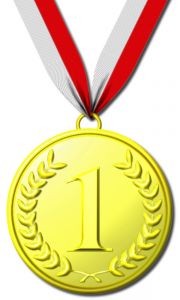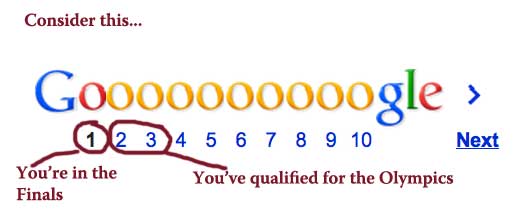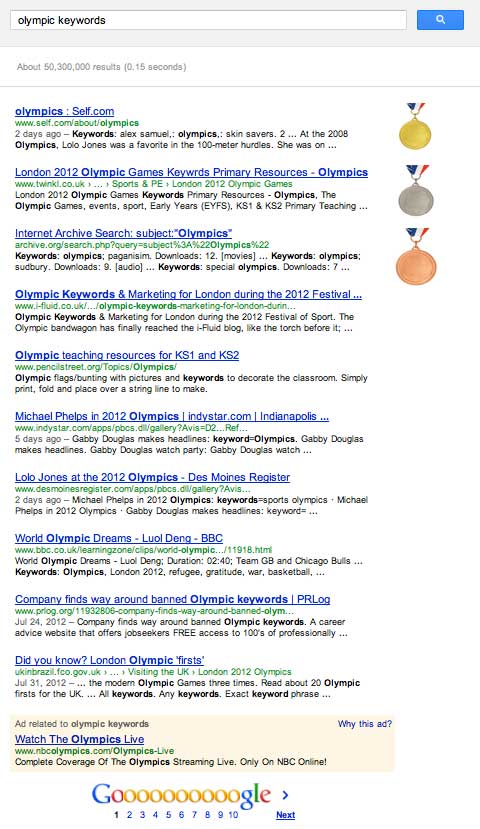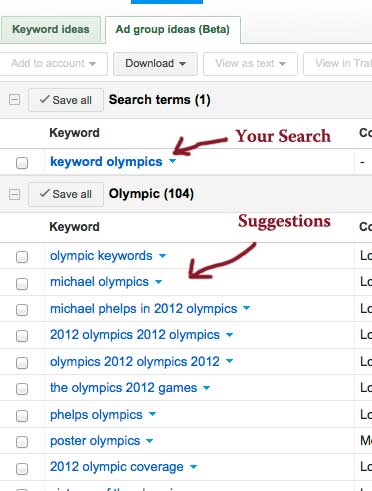 I’ve been watching the Olympics as much as I can. Even with the disappointing TV coverage, it’s hard not to get sucked into the excitement. The talent and obvious hard work of the athletes is impressive and inspirational. One thing that’s struck me during these games is the obsession with getting gold. Silver has brought many to tears and a bronze medal – well, it’s as though they shouldn’t have shown up. For me, just making it to the Olympics is a massive achievement. So, how does this relate to Internet marketing?
I’ve been watching the Olympics as much as I can. Even with the disappointing TV coverage, it’s hard not to get sucked into the excitement. The talent and obvious hard work of the athletes is impressive and inspirational. One thing that’s struck me during these games is the obsession with getting gold. Silver has brought many to tears and a bronze medal – well, it’s as though they shouldn’t have shown up. For me, just making it to the Olympics is a massive achievement. So, how does this relate to Internet marketing?
When it comes to search rankings, it’s generally believed that if you rank past page 3, you won’t generate a lot of traffic. Many assume folks will do another search before digging this far through the pages. I think if you can get a result on the first 3 pages for a searched keyword, you’ll get some action. It’s like qualifying for the Olympics.
Getting to the Olympics is certainly an achievement. Even for the lower searched keywords, there’s usually competition. Sometimes you can luck your way in. Sometimes you may get there without trying. Overall, it takes some work. Even with a top 3 page result, it’s not going to be good enough. If the website is to be a valuable business component, you’re going to want to get to the top. Gold.
There’s definitely something to be said for that top spot. A Google search #1 spot generally gets 38% of clicks, 2nd gets around 20% and 3rd about 10% and then it’s downhill from there. Excluding geotargeting and personalized results, the differences between the top 3 spots can sometimes be pretty significant. You might think the best thing to do is shoot for #1 for the most popular keyword? Well, there’s a bit more to it than that. If your height is 5’3″, does it make sense to compete as a high jumper? How about a 120lb shot putter? You still need to determine what’s relevant and achievable.
When it comes to sport, you generally work out what you’re good at when you’re young. Some may get pushed into certain sports and others fall into a sport. If your goal is to win gold at the Olympics, it makes sense to choose a sport that’s actually included in the games. Keyword selection is a little like this as well. There’s some initial figuring out to do. You need to do your research and see what’s currently performing via analytics. Ask people around you. Use your gut instinct. Experience helps as well.
To work out your keyword selection, do some data crunching through tools such as the Google External Keyword Tool. It also offers suggestions you may not have considered. You’ll also see numbers of searches and a rough estimation of competition. This is very valuable information to start with.
At Dinkum, we’ve held and still hold top spots for some very competitive keyword phrases. But even as we get to know a company and the services it offers, we cannot know it as well as those in the trenches. The greatest success comes from closely working with clients during this initial part of the process. I’ve targeted the right and wrong keywords. Like an Olympic archer, some research has missed the mark while others have hit bang on the bulls-eye. My advice is to not rely on data alone.
Start with the Data: While some people start and finish with the data, this is a shortcoming for young players. You cannot rely on data alone to drive your keyword selection otherwise you are setting yourself up for failure. You can do as many searches v competitors v kei as you like but the reality is more nuanced than that. Like sport, if you’re a good swimmer, there are still a few options to choose from. Butterfly. Backstroke. Breaststroke. Freestyle. If you sell books, you can offer new books, used books, old books or rare books.
Add Relevance: You’re a good swimmer so should you consider diving? How about adding the 100 fly? Scrap keyword phrases that are ‘loosely’ related because they ‘might’ garner some traffic. Chances are they won’t. They’ll be the wrong kind of traffic and they’ll take your focus.
Play To Your Strengths: Keeping focus can be tough especially when you want it all. You’re an injury lawyer, a defense lawyer, a Memphis attorney, a maritime lawyer and a real estate litigator. You might want to select keywords for each one. I’d suggest figuring out what you’re best known for and starting there. You can add other keywords once you gain traction.
Be Patient: This advice might be the opposite of what you expect on the Internet. But just like top athletes, you’re not going to get gold right away. You need lots of work, practice, perseverance, missteps, victories, and adjustments along the way. Don’t give up after the first week.
There’s no denying that getting to the top is good. Getting to the top for a relevant, searched keyword phrase can be the difference between an Usain Bolt gold and Dong Dong gold. Both got the top medal but only one is an international household name. It’s the same with keywords.
Photo Credit: http://www.sxc.hu/photo/1187896







